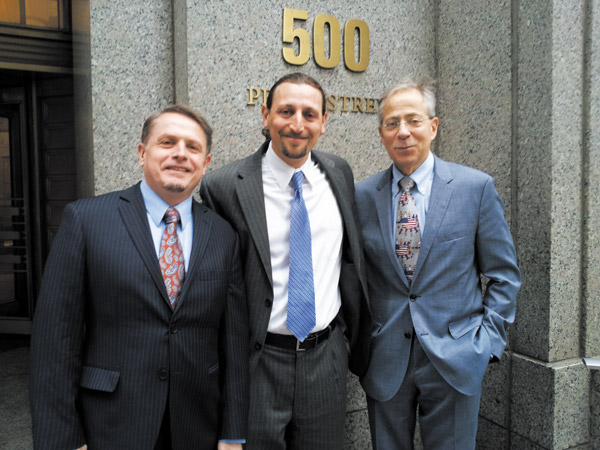
Robert Pinter, left, with his attorneys Jeffrey A. Rothman and James I. Meyerson outside the US District Court on Pearl Street in Manhattan.
BY DUNCAN OSBORNE | Material unearthed in a federal lawsuit brought by a gay man who charges he was falsely arrested for prostitution in a Manhattan porn shop in 2008 suggests the Bloomberg administration was actively involved in directing such prostitution arrests at that time.
Police arrested at least 30 men for prostitution in at least six Manhattan porn shops in 2008. The arrests, widely seen as false arrests in the queer community, were used in nuisance abatement lawsuits brought by the police department or the Mayor’s Office of Special Enforcement that were intended to shut the porn shops down.
Robert Pinter, 57, was among 12 men arrested in Blue Door Video, an East Village porn shop. He sued the city in 2009.
With discovery in Pinter’s case “largely completed,” his lawyer said in court on April 18, he learned that a still unidentified staffer in the Mayor’s Office of Special Enforcement called police on the day of his arrest and instructed officers in the Manhattan South Vice Enforcement Squad to go to Blue Door and arrest someone.
“Her office called the commanding officer of Manhattan South and asked to go to the Blue Door and asked them to get an arrest,” said James I. Meyerson, Pinter’s attorney, referring to Shari C. Hyman, then the director of the office. “There is no question that they would not have gone to the Blue Door, but for that call.”
Dara Olds, an attorney in the city’s Law Department who is defending the city, said in court that the call was made.
“That phone call, we don’t contest, was made from the mayor’s office,” Olds said.
In 2009, Mayor Michael Bloomberg said the police department was in charge of the effort. The police pointed to taxpayer complaints about prostitution in the porn shops as the impetus for the arrests.
Activists who have followed the controversy suspect that the arrests were a pretext and the goal was to produce arrests that could be used in the nuisance abatement lawsuits. Starting in the Giuliani administration, City Hall has had an ongoing effort to eradicate porn shops in Manhattan.
The circumstances of the arrests added further fuel to activists’ suspicions. Most of the men were in their 30s, 40s or 50s, unlikely ages for prostitutes. They were approached by young men, who turned out to be undercover vice cops, who aggressively flirted with them. After the men agreed to consensual sex, the undercover cops said they would pay for the sex. The men were then arrested for prostitution. Eight of the 12 men arrested in Blue Door were between the ages of 42 and 54.
Some of the arrests appeared ridiculous. Four of the men arrested in Blue Door were from out of state, from as far away as California and Virginia. Two men were a couple, 37 and 44, who traveled to New York City from Europe and were staying in the Astor on the Park Hotel on Central Park West. Allegedly, they agreed to accept $20 each for anal sex.
Other facts in the Blue Door nuisance abatement lawsuit suggest that the special enforcement office was directing the work of the police.
The shop was temporarily closed in June 2008 after police made 10 prostitution arrests there. To reopen, the owner agreed to pay hefty fines and to bar “lewdness, assignation, or prostitution” in the shop, according to an agreement he signed with the city. Assignation could be two men meeting in the shop and agreeing to have sex elsewhere, an entirely legal activity.
In August of that year, an undercover officer reported looking through a glory hole in a buddy booth in the shop and seeing two men engaging in oral sex. He did not make an arrest. When that same officer later solicited one of those two men, the man said, “No, I don’t want your money, only your body.”
The activities observed by the officer violated the agreement Blue Door inked with the city, so the undercover’s report of those occurrences suggest that officers were instructed by the special enforcement office to look for and document such violations.
In 2011, a federal appeals panel eliminated some of the defendants named in Pinter’s lawsuit and some of his claims. He is now pursuing multiple claims, including excessive force resulting from his being handcuffed for three hours following his arrest and malicious prosecution stemming from the phone call that led to his arrest.
The city’s position in court was that Blue Door’s owner could complain that the phone call led to harm because the act was directed against the shop, but that Pinter could not because the instruction was not to arrest him specifically.
“I don’t think there is any evidence of malicious prosecution with respect to his client,” Olds said.
The mayor’s press office referred calls to the city’s Law Department. A spokesperson there, in an email message, said, “The city’s position on this issue remains consistent. The fact is, there was a pattern of community complaints about illegal activity at the store, and the city has responded to it appropriately.”
Pinter is one of five men who were arrested who sued in federal court. A sixth man sued in state court. The city has designated Pinter’s case a “no pay” case and is refusing to settle. The state court case is also unresolved. The other plaintiffs negotiated settlements.



































